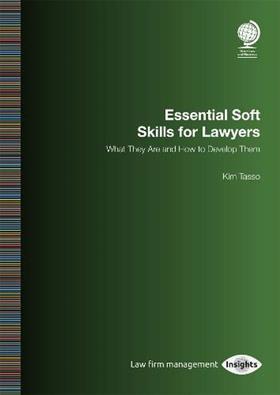Essential Soft Skills for Lawyers: What They Are and How to Develop Them
Kim Tasso
£95, Globe Law and Business
★★★✩✩
What makes a good lawyer? Anyone can find out what the law is. We have additional skills in applying that knowledge and solving problems. It is our judgement we are paid for, not just what we know. During the coronavirus pandemic, when we have been unable to see clients face to face, we have had to acquire new technology skills and adapt our telephone manner. The ability to listen and concentrate while a line breaks up is not always easy.

New technology is vital but can be disastrous if you copy the judge in to an email complaining about them, or send another ‘to all’ or the wrong person. The content of electronic messages can be curt and difficult to convey the right meaning unless you add an emoji – but is that professional?
The profession is probably facing a ‘tidal wave of burnout’, as quoted in this book. The coronavirus epidemic has added to the pressures on us. This book is about the so-called ‘soft skills’ or people skills that complement hard skills, such as knowing what the law is. Those soft skills include sound judgement, communication and the equivalent of the bedside manner which doctors have (or used to). These are not new skills.
The SRA competencies include working with other people. Negotiating and advocacy have been taught for some years. The first type of legal training consisted of rubbing shoulders with experienced lawyers in Inns of Court or during articles. Legal technical training only came in later. We still aspire to be the trusted adviser, such as Soames Forsyte.
There are many skills that we need as lawyers. How do we acquire or teach them to others? What do we do about lawyers with no ‘people skills’? The single most important way is by experience, which cannot be rushed but it can be shared. These are the issues this book covers. It includes perspectives from different points of view, including what clients think of us, which is illuminating. Not surprisingly they include the importance of feeling valued and special. There also contributions from other professionals.
Sometimes the text is a little disjointed and the quotes are not always helpful. However, the book covers the areas well and there is a helpful section on other resources, including the perennially popular How to Win Friends and Influence People by Dale Carnegie which I ought to read before I retire.
We all need to brush up our abilities, particularly at this demanding time. How do we learn to look interested when stuck in the corner of a room at a networking event being talked to about widgets, or learn to talk in public without sounding like a lawyer? Client skills such as making a good first impression, good communication as well as empathy are needed like never before.
David Pickup is a partner at Pickup & Scott Solicitors, Aylesbury
- Would you be interested in writing a book review for the Law Society Gazette? The Gazette receives books on a range of legal specialisms, as well as fiction, history and biography. If you are interested please write to Nicholas Goodman indicating your specialism
































1 Reader's comment